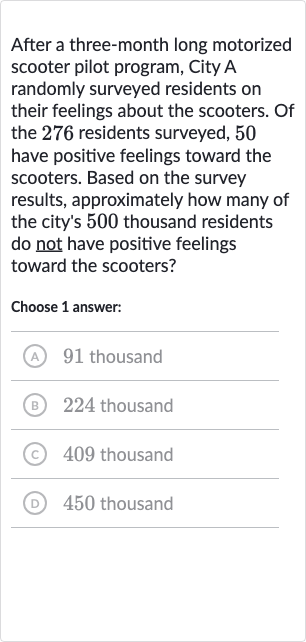AI tutor
Welcome to Bytelearn!
Let’s check out your problem:

After a three-month long motorized scooter pilot program, City A randomly surveyed residents on their feelings about the scooters. Of the residents surveyed, have positive feelings toward the scooters. Based on the survey results, approximately how many of the city's thousand residents do not have positive feelings toward the scooters?Choose answer:(A) thousand(B) thousand(C) thousand(D) thousand
Full solution
Q. After a three-month long motorized scooter pilot program, City A randomly surveyed residents on their feelings about the scooters. Of the residents surveyed, have positive feelings toward the scooters. Based on the survey results, approximately how many of the city's thousand residents do not have positive feelings toward the scooters?Choose answer:(A) thousand(B) thousand(C) thousand(D) thousand
- Proportion of positive feelings: Determine the proportion of residents surveyed who have positive feelings toward the scooters.To find this proportion, divide the number of residents with positive feelings by the total number of residents surveyed.
- Proportion of negative feelings: Determine the proportion of residents surveyed who have positive feelings toward the scooters.
- Calculate Number of Negatives: Calculate the approximate number of residents who do not have positive feelings.To find this number, multiply the proportion of residents surveyed who have positive feelings by the total population of the city.
- Round the Result: Round the result to the nearest thousand if necessary.Since the answer choices are in whole thousands, round the result accordingly. The closest answer from the given options is thousand.
More problems from Multi-step problems with unit conversions
QuestionGet tutor help
QuestionGet tutor help
QuestionGet tutor help
QuestionGet tutor help
QuestionGet tutor help
